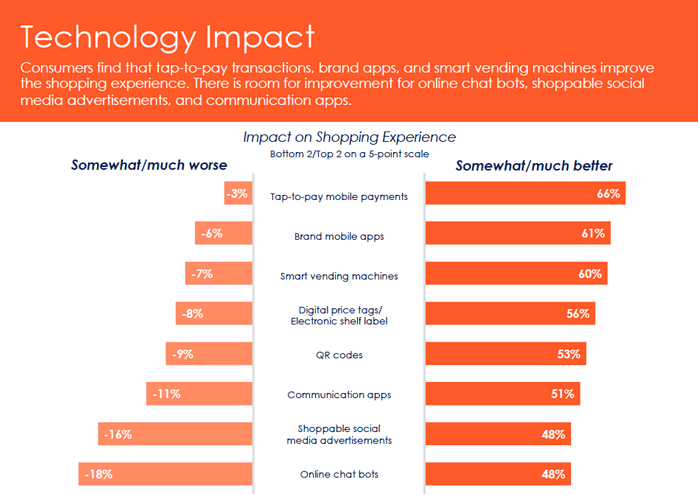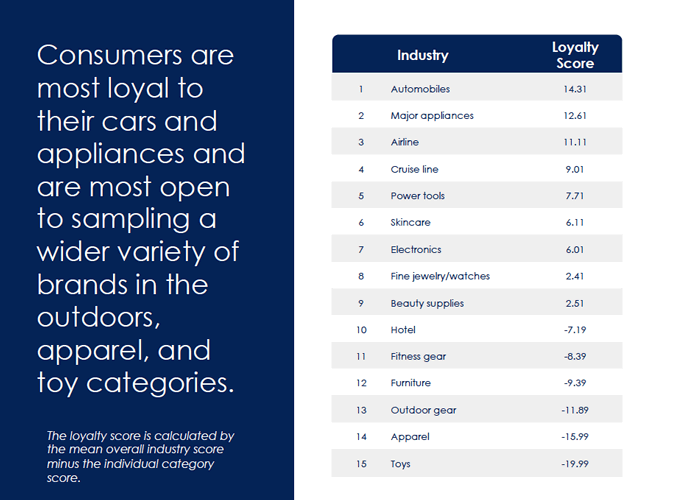- Understanding brand loyalty and the shopper mindset is vital in helping retailers manage and grow.
- Even though small business buyers see most retail technologies as helpful, they are aware yet unimpressed with chatbots.
- Consumers who see value in retail technology are more likely (73%) to prefer familiar brands than those who are unimpressed with the tech.

In today’s increasingly digital world, it has become easier for brands to expand consumers’ awareness. However, this is useless without loyal customers. Understanding brand loyalty and the shopper mindset is vital in helping retailers manage and grow in this ever-changing market.
Provoke Insights, a full-service market research firm, launched a new bi-annual trends study to answer these pressing questions. Covering multiple industries and shopping themes, including retail technology, they dug deep to find exactly what consumers are looking for when it comes to technology and retail, and ultimately, what will help create loyal customers.
Retail Technology Preferences
Here are some of the most popular retail technologies that consumers want to see in stores:
QR Codes
Customer awareness of QR codes, tap-to-pay mobile payments, and brand mobile apps is high. Those who prefer buying from small businesses are more aware of retail technologies. However, high awareness does not always lead to impressed consumers. Although QR codes have the highest level of awareness (71%), only about half of those aware (53%) believe they improve their shopping experience.
Tap-to-Pay Mobile Payments
Sixty-six percent of respondents said they were aware of tap-to-pay mobile payments, and also see the most value in this technology — citing it as having the best impact on their shopping experience compared to other technologies.
Brand Mobile Apps
Fifty-nine percent of respondents said they are aware of brand mobile apps, and 61 percent say these apps make the shopping experience better. It is noteworthy that small business shoppers find brand mobile apps more helpful than those who do not shop from smaller businesses, meaning that the mobile experience for indie retailers is better overall.
Smart Vending Machines
Smart vending machines offer exceptional shopping experiences to customers. They use high-definition touchscreen displays to showcase high-quality product photos and animations. Businesses can also add custom user interfaces to attract customers with interactive videos and commercials. While only 41 percent of respondents were aware of smart vending machines, 60 percent said they made the shopping experience better.
Even though small business buyers see most retail technologies as helpful, they are aware yet unimpressed with chatbots. There is also room for improvement with shoppable social media advertisements and communication apps.

Retail Technology Fan Shopping Habits
Americans who find technology helpful within the shopping experience prioritize the environment and sustainability (64%). They also prefer supporting small businesses (57%). As far as concerns go regarding COVID-19, tech-savvy consumers are the least worried about shopping in person. In fact, Provoke Insights also found that more customers are returning to in-person shopping as concerns for the pandemic decrease.
Has In-Person Shopping Improved?
When it comes to shopping in person, fans of retail technology are impressed with store cleanliness (36%) and customer service (30%). However, they see room for improvement in product availability (23%). Vacant shelves could just be another downside of the pandemic, but it is clear that this issue still concerns shoppers.
Consumers Prefer These Products
Based on what they purchased in the month prior to taking the Provoke Insights survey, these are the items that customers purchased the most both online and in store:
- Apparel
- Streaming Services
- Electronics
- Beauty Supplies

Technology Fans are Loyal to Brands
Consumers who see value in retail technology are more likely (73%) to prefer familiar brands than those who are unimpressed with the tech. Shoppers are more loyal to retailers they regularly purchase power tools, skincare, electronics, fine jewelry and watches, and beauty supplies from. Customers are more open to sampling a wider variety of brands that sell fitness gear, furniture, outdoor gear, apparel, and toys.
The pandemic put a halt to many loyalty strategies that retailers had in store since most consumers were shopping online. Now, as pandemic concerns continue to decrease and shoppers return to brick-and-mortar, there is an abundance of opportunities to develop a lasting relationship and create loyal customers — especially with technology.
